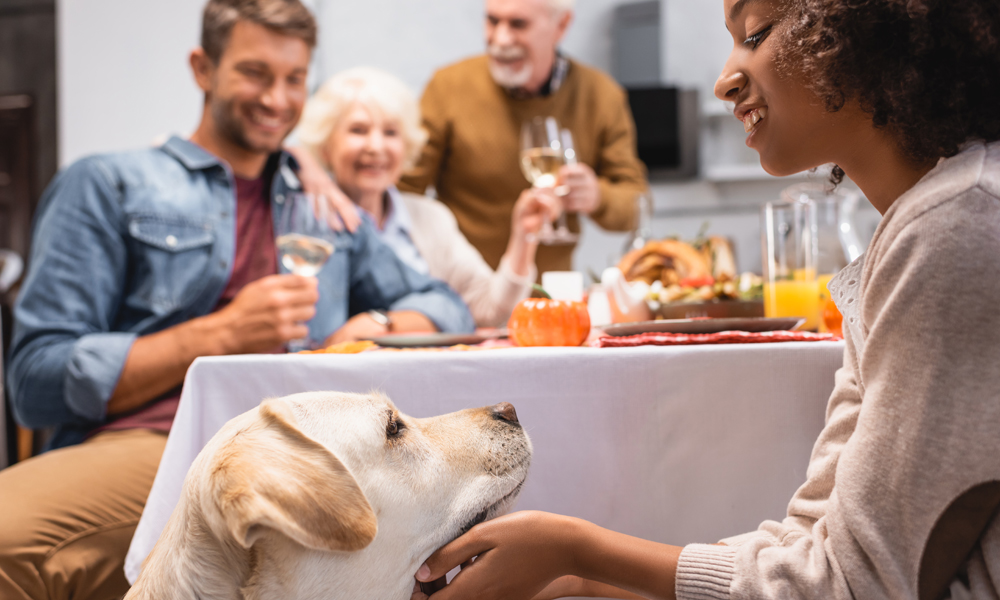Wondering which human holiday foods are safe for dogs? Keeping an eye on portion sizes, along with knowing which ingredients are safe for dogs, is how you can do it safely — and avoid a mess in the house or the yard later. Stay away from high fat foods that can irritate your dog’s gut and result in unwanted messes in the house and yard. Also, be aware of foods that are toxic and even poisonous to dogs.
Check out our Ultimate list of people foods for dogs
First, a word about fatty human foods and your dog.
The foods we enjoy during the festive season are almost always high in fat, which is what makes them so special and delicious. But overloading his body with fat content, whether it’s from the butter in the mashed potatoes or turkey skin, can have ill effects on your dog’s system.
- Too much fat causes tummy upset, which can result in messy poops and vomiting — neither of which would make your holiday any merrier.
- An overload of fat can also elevate the dog’s risk of developing pancreatitis. This inflammation in the pancreas causes digestive enzymes to spill out, damaging the liver and intestines.
To be on the safe side, when treating your pet during the holidays, steer clear of fatty festive foods loaded with butter, cream and gravy. If you want to play it safe but still provide fun holiday fare for your dog, grab a bag of NutriSource PureVita Turkey & Sweet Potato so he can join in on the meal!
Which Thanksgiving foods can dogs eat?
Here, we’ll take you through the Thanksgiving menu so you know which foods are safe for your dog, and which are off-limits.
Can dogs have turkey?
Turkey is not only safe but it’s also nutritious for canines. Caveat: It’s safe as long as you remove the skin, skip the gravy and make sure there are no bones, no pan drippings and no onions (toxic to dogs) in your dog’s share. Keep it plain and simple by serving a slice of lean turkey breast.
Can dogs have turkey bones?
You know the saying: Give the dog a bone! But on Thanksgiving, cooked turkey bones are too brittle to share with dogs. They can easily snap and splinter. Wounds caused by bone shards of cooked turkey can range from mouth injuries to a bacterial infection called peritonitis, caused by punctures in the stomach or intestines.
Can dogs have gravy?
It can be satisfying watching your dog happily lap up a plate of savory gravy. But the kind we serve on Thanksgiving can be packed with high-fat pan drippings along with butter.
For many dogs, too much Thanksgiving gravy can result in an upset stomach (followed by vomiting and messy poop). Stick to small portions, and make sure it’s free of onions.
Can dogs have butternut squash?
Cooked squash, including that of the butternut variety, offers beta carotene and nutrients to dogs, plus they tend to enjoy the flavor. But avoid feeding him samples that are loaded with butter and sugar. A healthier option is offering a share of plain cooked squash.
Can dogs have yams?
Cooked yams along with sweet potatoes also make a wonderful nutrient-dense side dish for dogs, as long as they’re served plain. Don’t share your famous candied yams, because the brown sugar, butter and marshmallows can upset your dog’s system.
Make sure yams or sweet potatoes are fully peeled and cooked before offering any to your dog. Otherwise, they can be difficult to digest, not to mention the hard, raw pieces can create serious issues, such as intestinal blockage.
Can dogs eat cornbread?
Small amounts of cornbread as an occasional treat will not harm most dogs. But if your best friend has past issues with wheat and corn (especially from a supermarket brand of dog food), skip the cornbread.
If you’re thinking of including a sample of cornbread stuffing, don’t do it. Onions are toxic to dogs and it’s a common ingredient in recipes for stuffing and dressing.
Can dogs have pumpkin pie?
Pumpkin alone isn’t a problem for dogs. It’s the high sugar and cream that’s added to the filling that causes gastric distress. If you want to add a touch of gourd to your dog’s feast, set aside a bit of plain pumpkin puree before making your famous pie.
Can dogs have green beans?
Plain green beans, raw or steamed, make a delicious snack for dogs. When it comes to Thanksgiving fare, don’t share the green bean casserole. First and foremost, onions are just bad for dogs, and the friend onion topping found on the popular Thanksgiving side dish is enough to put it on the do-not-serve list. Also, the high-fat cream-based soup can upset your dog’s system.
Can dogs have mashed potatoes?
Mashed potatoes are often enriched with butter and fatty milk, causing gastric upset in dogs. Better to serve unseasoned potatoes that are roasted or boiled.
Can dogs have cranberry sauce?
Cranberries are fine for dogs. But if you’ve ever made cranberry sauce at home, you’ll know it has plenty of sugar. So if you want to dish up a side of sauce, be sure to limit it to nothing more than a taste.
Can dogs enjoy holiday treats?
Beware of sharing your holiday treats with your dog. The high amounts of sugar, salt and fat can leave your best friend feeling unwell after their snack (and leave you with a mess to clean up, on the floor or in the yard).
Also, consider your dog. Interesting and novel aromas and flavors will catch your dog’s attention, so plan accordingly. Keep the tempting platters of appetizers and plates of holiday cookies well out of reach. (That means no leaving unattended cookies for Santa.)
For more holiday help, read Canine behavior explained: Why dogs beg and how to end it
Can dogs have pecans?
Don’t share your nut-laden treat with your dog. Many tree nuts contain toxins and molds that can hurt dogs, especially if they gobble up a large serving. (If your dog scarfs up, say, a small dropped piece, it’s probably nothing to worry about.) Pecans in particular have juglone, a known toxin to dogs.
Can dogs have white chocolate?
Regular chocolate is a well-known poison to dogs. The compound theobromine found in the cacao bean makes dogs very ill and it can even be fatal. White chocolate, on the other hand, has no cacao. While white chocolate isn’t poisonous, the high sugar and fat content can still give your dog a tummy ache.
Can dogs have peppermint candy?
Keep those candy canes out of your dog’s reach. An artificial sweetener called Xylitol can be fatal to dogs when eaten, and it can go to work quickly in your dog, causing a rapid plunge in their blood sugar levels, which can lead to complications, including seizures, liver damage and even death. Even if the hard peppermint candy doesn’t have artificial sweetener, dogs can end up eating the wrapper with the treat, which can lead to serious issues, including a bowel obstruction.
Can dogs have ham and ham bones?
Ham is delicious, and we’re sure most dogs would agree. But it’s high in fat and sodium. An overload of salt in your dog’s system can lead to vomiting, diarrhea and excess thirst — things you don’t want to deal with during a busy holiday season. If you do share, keep it small.
After the feast, can you give your dog the leftover ham bone to gnaw on? No — keep cooked ham bones away from your dog. Cooked bones shatter and splinter very easily, and that applies to pork bones as well as poultry and beef. If your dog ingests these shards they can get hurt, in the mouth or internally. A better alternative is to purchase a meaty bone at your local independent pet supplier, so you can safely include your best friend in the festivities.
Can dogs have gingerbread cookies?
Many gingerbread recipes have at least some nutmeg, which is a known hallucinogenic to dogs. Important caveat: They’d have to ingest a large amount of nutmeg for that psychedelic effect to kick in. Your gingerbread recipe likely has too little nutmeg to be toxic. But it can irritate your dog’s stomach, reason enough to keep these treats away from your pet.
Keep treats on hand
Family-owned NutriSource Soft and Tender Treats are the perfect “good dog” snack to keep on hand. They’re 3.5 calories apiece and fortified with Carniking™, a trusted source of L-Carnitine to help your pet burn fat. They come in three delicious flavors: chicken, lamb and salmon. Shop local, and pick up a pouch at an independent pet supply shop in your community.


